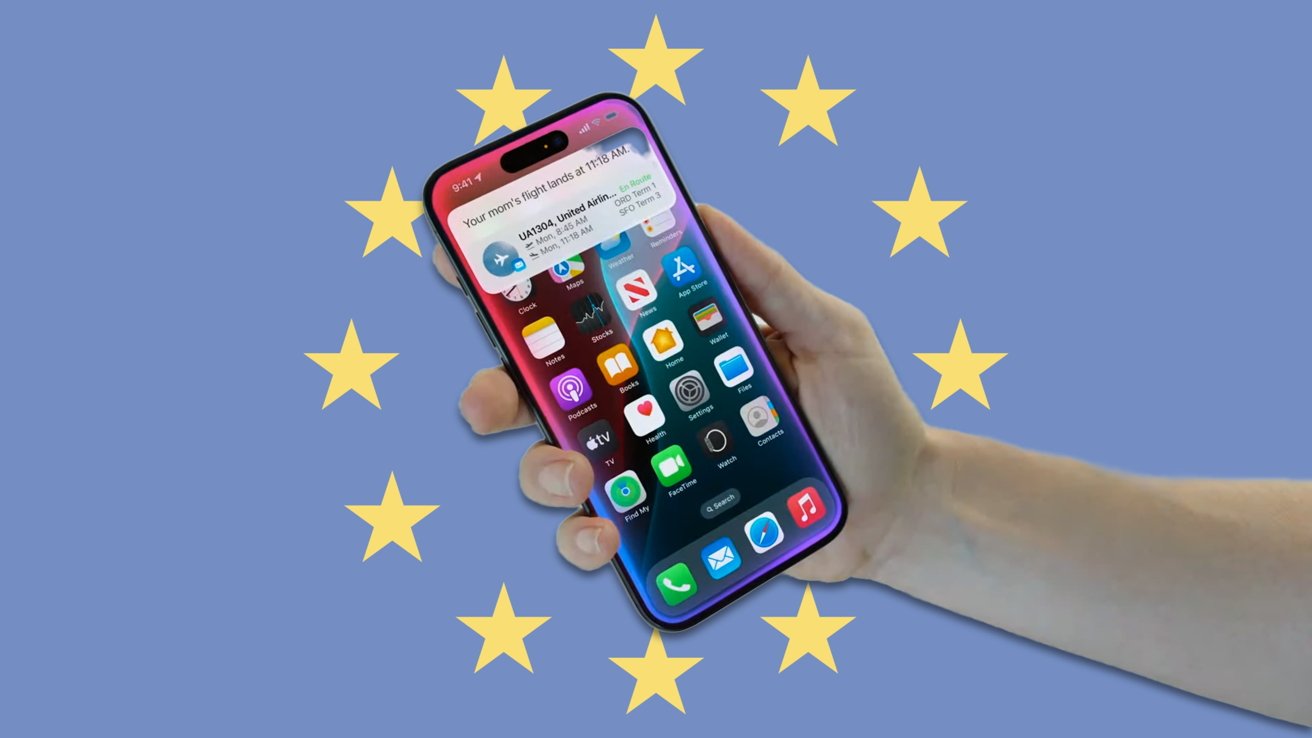Apple Intelligence & iPhone mirroring aren't coming to EU because of the DMA
Apple isn't releasing Apple Intelligence and other major operating system changes in the EU, because of Digital Markets Act interoperability mandates.

An iPhone running Apple Intelligence, in front of the EU flag
The biggest changes in Apple's fall operating system updates include the machine learning-based Apple Intelligence as well as iPhone Mirroring and SharePlay Screen Sharing. While most of the world should get the features in time, Apple says that the EU will miss out on the inbound tech.
Two weeks ago, Apple unveiled hundreds of new features that we are excited to bring to our users around the world. We are highly motivated to make these technologies accessible to all users. However, due to the regulatory uncertainties brought about by the Digital Markets Act (DMA), we do not believe that we will be able to roll out three of these features -- iPhone Mirroring, SharePlay Screen Sharing enhancements, and Apple Intelligence -- to our EU users this year.Specifically, we are concerned that the interoperability requirements of the DMA could force us to compromise the integrity of our products in ways that risk user privacy and data security. We are committed to collaborating with the European Commission in an attempt to find a solution that would enable us to deliver these features to our EU customers without compromising their safety.
At the time of publication, checks on regional Apple Newsroom pages don't offer any statements beyond what Apple has provided, and even say that features like Apple Intelligence are on the way.
The Digital Markets Act sets rules to force Apple and other tech giants to open up various services, like the App Store, to encourage more competition. In the EU, Apple has already complied with some of the legislation, such as allowing alternative app storefronts to exist on iPhone, but it's still dragging its feet in other ways.
Apple has already been hit with a $2 billion fine for allegedly preventing Apple Music rivals from promoting cheaper alternatives. It also faces being the first to be fined over its anti-steering rules under the Digital Markets Act itself.
Apple Fellow Phil Schiller warned in February that the Digital Markets Act's implementation in the EU could become a privacy and security problem to consumers. While it introduces new dangers to the market, Schiller insisted Apple was doing whatever it could to minimize those risks.
Update June 21 4:24 PM ET Updated with Apple's statement on the matter.
Read on AppleInsider

Comments
As the old proverb states "you want to go fast, go alone. You want to go far, go with a group"
It's important to differentiate nascent technology and the need for fast iteration as opposed to time tested and established technology which should be interoperable across a large group.
Here is where I agree in part with the ideology of DMA. Messaging apps are simple in nature. I'm exchanging text primarily which may have additional functionality. That being said though I don't see Messaging apps as a significant impediment to communication. Messaging would not be the proper litmus or use case for all digital technology.
Yep, all the EU features like a single market, customs union, free movement, no roaming charges, being part of multiple cross-country organisations and initiatives. No, wait. We lost all those, and more, when we left. Never mind though ‘cos if Apple can stick it to the EU then who cares?
Thank god for Brexit.
Europe has been very protectionist, especially of Spotify, which is why we see the tone of some the comments. It’s not really surprising to see Apple react.
Apple Intelligence will be so deeply integrated, but they must be building it in such a way where it can be disabled regionally. Interesting. Will VPNs trick it?
The one thing in common with most of the standards that establish hard requirements is that they are run by NGOs, not politicians or state leaders. Companies like Apple who produce products for international markets need to be able to design products that meet all the standards where they are sold. The DMA from what I can tell provides no prescriptive guidance for product makers to avoid getting "surprised" when they try to sell a product into a location. It's hard to build something to meet requirements that are highly volatile and enforced at the whim of the enforcers.
I'm not saying the EU or DMA are wrong, because every other locale puts similar non-quantitative and highly subjective impediments in place. I'm just saying that it's a tough nut to crack and companies that sell into other markets need to protect themselves from impositions that they cannot predict. So Apple limiting what they sell into various markets is entirely defensible and a pragmatic decision, not a politically motivated one.